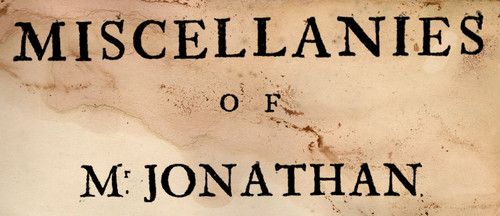
unearths some literary gems.
Here, in a mystery story by Ernest Bramah, is a delightful twist on the "loquacious witness" trope: instead of giving her rambling testimony verbatim, he characterizes it from a scholarly distance!
"Mrs. Jones’s testimony, given on the frequently expressed understanding that she was quite prepared to be struck dead at any point of it if she deviated from the strictest line of truth, did not disclose any new feature, while its frequent references to the lives and opinions of friends not concerned in the progress of the drama threatened now and then to stifle the narrative with a surfeit of pronouns."
***
From a "To the Reader" note in The Surprising Adventures of the Magical Monarch of Mo and His People, by L. Frank Baum. Note also that this inclusive "we" is quite distinct from the authorial "I" appearing in the same sentence.
"These questions I realize should be answered before we (that "we" means you and the book) can settle down together for a comfortable reading of all the wonders and astonishing adventures I shall endeavor faithfully to relate."
***
Here's a grandfather clock that's anthropomorphized more than in name only, from Dorothy Sayers:
"The grandfather on the stairs was promptly eliminated [as the source of the chime being investigated]; his voice was thin and high and quavering, like the voice of the very old gentleman that he was."
And another bit from Sayers:
"Over a pair of very sharp gray eyes, heavy gray eyebrows hung like a pent-house."
***
Here's a Poirotism I like:
"My friend Hastings is, as you say in England, all at the seaside."
I also like Poirot's duodecimal-friendly self-criticism, when he says he is thirty-six times an imbecile. (I also like the more involved mathematics taking place on this particular occasion: "I have been not a triple imbecile, but thirty-six times one.")



